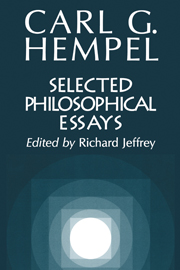Book contents
Chapter 6 - On the Content of Probability Statements
Published online by Cambridge University Press: 05 June 2012
Summary
INTRODUCTION
The following inquiry attempts to contribute to the logical analysis of the concept of probability. Philosophical efforts to clarify this concept are as old as its history, and the basic ideas of the two main groups of theories which seek to determine its meaning go back to the beginnings of this history. For a first orientation, these may be contrasted as the “aprioristic” and “empiricist” views of probability.
On the aprioristic views, probability theory rests on a priori judgments of proportions in empirical or logical space. On the empiricist views, probability theory concerns the relative frequencies with which certain results occur in statistical series of empirical observations.
At present, these two views are no longer on an equal footing. Instead, the progressive refinement of the logical analysis of scientific concept formations has made it increasingly clear that an adequate logico-descriptive theory of the probability concept can be found only in the direction in which the empiricist interpretation seeks it.
A consistent realization of the empiricist view, however, leads to certain logical difficulties, which have not been completely overcome even in the latest articulations of the empiricalstatistical probability theory. The present study examines these difficulties and develops a proposal for their removal on the basis of a “finitistic” turn of the statistical interpretation of the probability concept.
LOGICAL DIFFICULTIES OF THE STATISTICAL INTERPRETATION
The basic problem of the logical analysis of the probability concept – the problem in response to which the theory groups just mentioned differ from each other – is the question of the meaning of probability statements (i.e., of statements which attribute a certain probability to an event).
- Type
- Chapter
- Information
- Selected Philosophical Essays , pp. 89 - 123Publisher: Cambridge University PressPrint publication year: 2000

